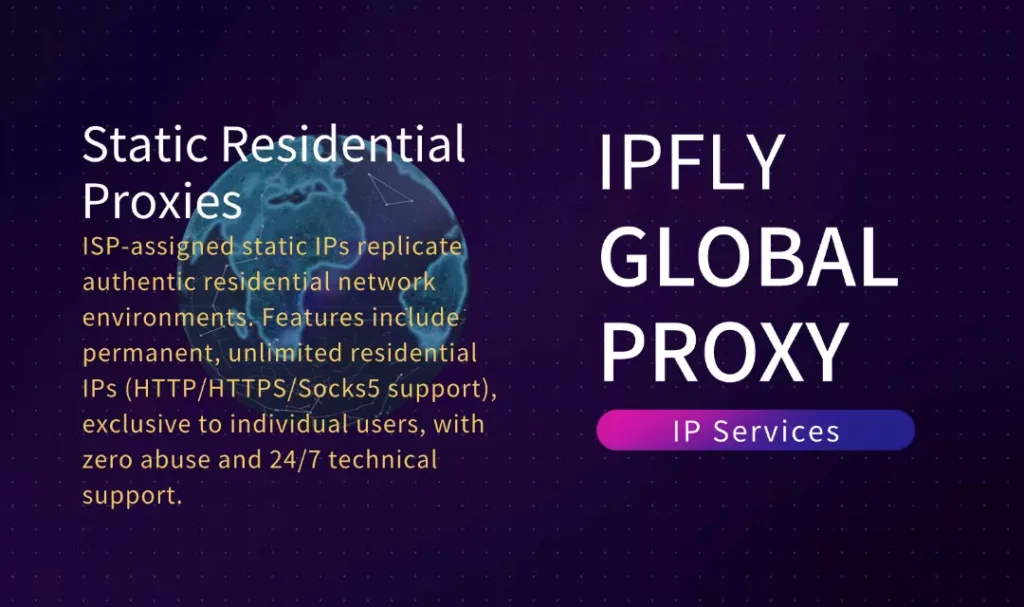Dealing with ISP whitelist restrictions has become a key challenge for many businesses in 2025. In regions where ISPs limit access to approved services, our teams have repeatedly encountered blocked connections to essential tools, from SaaS platforms to cloud databases. We firmly believe that the solution lies not in VPNs, but in the smart application of Static Residential Proxies, especially the ones offered by IPFLY. Here’s how they can help you stay connected, compliant, and confident.

Understanding ISP Whitelists in Today’s Networks
ISPs often maintain whitelists — lists of approved IPs or domains — to control which services users can reach. These lists can be updated for legal, security, or policy reasons, and any IP outside the whitelist gets blocked automatically. In this environment, even legitimate traffic from global platforms can be stopped.
Disruption for Global Teams: Multinational companies using marketing automation or remote collaboration may find critical tools suddenly inaccessible.
SaaS in the Crossfire: Cloud-based CRM tools, development platforms, and analytic engines are frequently blocked due to static whitelisting practices.
Accuracy for Digital Operations: Ad verifiers and e-commerce agencies require location-specific access; VPNs often fail when ISPs enforce strict whitelisting.
Why Static Residential Proxies Beat VPNs and Dynamic Proxy Pools
While VPNs and rotating proxies offer quick fixes, they fall short in whitelist-heavy environments. Here’s why Static Residential Proxies win:
Home-based, Real-World IPs: Unlike shared VPN addresses, our IPs are from true residential networks — they don’t raise flags.
Stable Addressing Over Time: Sessions remain consistent, eliminating interruptions caused by IP switches.
Geographically Precise: Connect from a specific city or country to satisfy whitelisted access criteria.
This means stable, trusted connectivity that rivals the quality of open, unfiltered internet access.
How Static Residential Proxies Work Around Whitelist Blocks
Our Static Residential solution reroutes your traffic through verified residential IPs. These IPs often align with ISP-approved address ranges, meaning your access looks perfectly normal to firewalls.
Here’s how we make it work:
1. Assign a fixed, high-trust proxy IP to your device or server.
2. Traffic appears to originate from within the ISP’s whitelist.
3. Whitelisting systems see no differences — your session remains uninterrupted.
The result is seamless access to previously blocked services, all while maintaining compliance and stability.
Advantages of Choosing IPFLY’s Proxy Approach

At IPFLY, we went beyond merely offering IPs. Our features enhance reliability and user confidence:
✅ Vast Network: Over 90 million residential IPs in 190+ countries ensure access everywhere.
✅ Leak-Proof Design: Built-in DNS, IP, and WebRTC leak testing guarantee your identity remains concealed.
✅ Transparent Health Monitoring: Our dashboard shows connection status, uptime, and performance in real time.
✅ Proactive Support: 24/7 expert engineers monitor IP reputation and rotate addresses before issues arise.
These advantages make our proxies far more reliable than VPN services or rotating address pools, especially when access depends on passing strict whitelist filters.
Real Business Examples: Whitelist Solutions in Action
Remote Collaboration Without Barriers
A global marketing firm was struggling with blocked access to communication and analytics tools for team members in restrictive regions. We provided residential proxy IPs compliant with local whitelist policies, restoring stable access immediately.
Ad Campaign Verification Across Borders
An agency verifying localized ads encountered blocked content during client demos. With region-specific static proxies, they regained full visibility and compliance with campaign delivery checks.
Secure Data Access for Field Researchers
Teams in areas enforcing strict data access controls needed reliable connectivity for cloud-based research tools. Our proxies allowed uninterrupted login and prevented session terminations, critical for data integrity.
Preparing for 2025’s Next-Gen Content Controls
ISP whitelist mechanisms are evolving — and so are we. Our roadmap includes:
✅ Intelligent Proxy Tagging: Flag IPs according to ISP ranges for mission-critical tasks.
✅ Automated Change Response: If ISP policies shift, our system suggests rapid IP adjustments.
✅ New Regional Coverage: Expanding to address increasing restrictions in emerging markets.
By staying proactive, we ensure you remain in control, not locked out.
Trust in Whitelist-Savvy Proxies, Not VPNs
In a world where ISP whitelists can block legitimate business tools, relying on VPNs or rotating proxies just won’t cut it. However, Static Residential Proxies from IPFLY give you the stability, trust, and geographic precision needed to bypass these sophisticated restrictions.

Our infrastructure, backed by industry-leading support and transparency, ensures your connectivity stays solid, even in the strictest environments. If your workflow depends on consistent global access, let’s talk at IPFLY. We’d be happy to design a proxy strategy that keeps your tools online, secure, and unaffected by external barriers.


